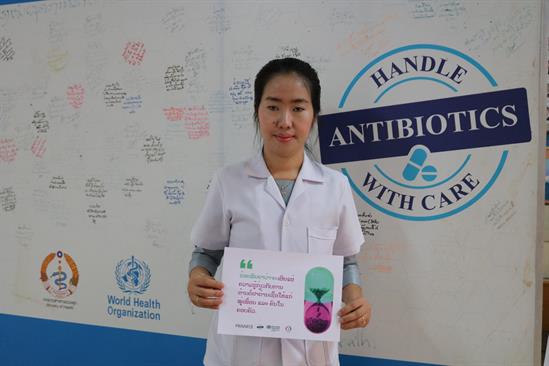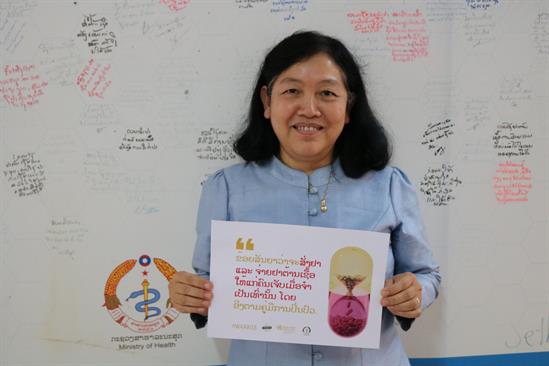The Ministry of Health and the WHO had a one-week campaign to mark this year’s World Antibiotic Awareness Week, in Vientiane Capital. More than 100 staff of Ministry of Health and UN have personally pledged to use antibiotics responsibly.

The WHO has declared November 12 to 18 as the World Antibiotic Awareness Week (WAAW), which aims to increase global awareness of antibiotic resistance and to avoid the further emergence and spread of antibiotic resistance.
Antibiotics are medicines that treat bacterial infections. They have had major positive health impacts around the world in past decades, making many previously life threatening infections curable with simple treatment. But with overuse and misuse of antibiotics in human and animal health, they are now losing their effectiveness. A growing list of infections – such as pneumonia, tuberculosis, blood poisoning, gonorrhoea, and foodborne diseases – are becoming harder, and sometimes impossible, to treat as many types of bacteria become more resistant to antibiotics.
For instance, in 2016, 490 000 people developed multi-drug resistant TB globally, and drug resistance is starting to complicate the fight against HIV and malaria as well. The spread of antibiotic resistance has become a global threat that requires action across all government sectors and society.
This year, staff at the Ministry of Health and WHO are joining the “Make a Pledge” campaign to pledge to use antibiotics responsibly, by holding a pledge card, taking a photo, and sharing it on social media.

Moeko, Matthew, Vieng, and Tone, WHO staff pledged against the irresponsibly use of antibiotics.
“Antibiotics are a precious resource, and we must make sure they protect our children and grandchildren as well as they have protected us,” said Dr Mark Jacobs, the new WHO Representative to Lao PDR.

Dr Mark Jacobs, the new WHO Representative to Lao PDR, with a pledge card written: “ I pledge to prevent the spread of infection by washing my hands regularly and prepare my food hygienically.”
More than 20 health workers in Setthathirath Hospital are also joining this campaign by pledging to educate patients about the importance of appropriate use of antibiotics.

“Doctors play an important role in educating the general public about antibiotic resistance, as patients may get antibiotics from doctors,” said Dr Khamla Choumlivong, Deputy Director of Setthathirath Hospital. ”It is important to prescribe and dispense antibiotics only when they are truly needed; ensuring the right dose for the right duration is also vital,” she added.

Dr Khamla Choumlivong held a pledge card on which it was written: “I pledge to prescribe & dispense antibiotics when they are needed, according to current guidelines.”
Antibiotic resistance is a complex problem that affects all of society. Coordinated action is required to minimize the emergence and spread of antibiotic resistance. The WHO is working with the Ministry of Health, the Ministry of Agriculture and Forestry, and partners to combat antibiotic resistance through developing a national strategy, strengthening surveillance systems, and promoting the responsible use of antibiotics in health care facilities and through media.
Everyone matters in the fight against antibiotic resistance. We can help stop the misuse of antibiotics in three simple ways: seeking and following advice from a qualified health professional on how to take antibiotics (including completing our course of treatment); preventing infections by regularly washing hands; and educating our family and friends about antibiotic resistance. We can also sign our online pledge on http://bit.ly/amr_vow and learn more about antibiotic resistance and what we can do to tackle it through http://bit.ly/2RaDQde.
